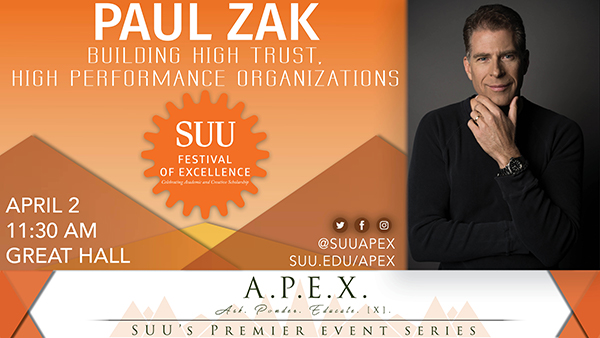
Building High-Trust, High-Performance Organizations
Paul Zak’s two decades of research have taken him from the Pentagon to Fortune 50 boardrooms to the rain forest of Papua New Guinea. All this in a quest to understand the neuroscience of human connection, human happiness, and effective teamwork. His academic lab and companies he has started develop and deploy neuroscience technologies to solve real problems faced by real people.
His latest book, Trust Factor: The Science of Creating High Performance Companies, uses neuroscience to measure and manage organizational cultures to inspire teamwork and accelerate business outcomes. His 2012 book, The Moral Molecule: The Source of Love and Prosperity, recounted his unlikely discovery of the neurochemical oxytocin as the key driver of trust, love, and morality that distinguish our humanity. In another obsession, Paul’s group uses neuroscience to quantify the impact of movies, advertising, stories, and consumer experiences. Along the way, he has helped start several transdisciplinary fields, including neuroeconomics, neuromanagement, and neuromarketing.
Paul is the founding Director of the Center for Neuroeconomics Studies and Professor of Economics, Psychology and Management at Claremont Graduate University. He has degrees in mathematics and economics from San Diego State University, a Ph.D. in economics from University of Pennsylvania, and post-doctoral training in neuroimaging from Harvard. You can check out his academic lab, consumer neuroscience company, and neuromanagement company. He also serves as a senior advisor to Finsbury, a global leader in strategic communications that advises many of the world’s most successful companies.
Reflection
On April 2nd A.P.E.X. Events presented the keynote speaker of the 2019 Festival of Excellence, Paul Zak. Zak's discussion titled, Trust Factor: Building High Trust, High Performance Organizations was met with A.P.E.X. Events' largest audience ever!
Zak research spanning over two decades has taking him to Fortune 50 companies, the Pentagon, and the rainforest of Papua New Guinea. This research has created his model of the "trust factor" oxytocin. Zak has continually visited organizations to help them develop their levels of efficiency and to inspire teams. He used the acronym "oxytocin" to help define a path of improvement between a company and its employees.
- O (Ovation) – Recognize excellence in your employees.
- X (eXpectation) – Design challenges with clear goals in mind.
- Y (Yield) – Giving control of projects to others and allow learning through mistakes
- T (Transfer) – Self management; colleagues can bid to do work. This can increase their interest, energy, and health.
- O (Openness) – Transparent Decision Making, explain why something is done.
- C (Caring) – Intentionally build relationships – recognize the emotions in others.
- I (Invest) – Help your colleagues grow
- N (Natural) – Be vulnerable and ask for help.
"The combination and effective use of all of these elements," Zak explained, "will flow from employees to customers."
Zak went on to explain how companies that exemplify these standards have become some of the most profitable in the last decade. One example he gave was Google. At times, Google employees have experienced more satisfying work lives, often have fewer sick days, and are highly productive.
As the keynote for the 2019 Festival of Excellence, Paul Zak showed our audience that trust can be a clear path to excellence for any team or organization. A.P.E.X. Events couldn't think of a better way to end our 2018-19 season!
Podcast
Video
Photos






































































